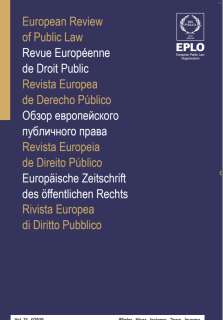
Constitutional Law / Droit constitutionnel
2019
Professor at Jagiellonian University in Krakow (e-mail: g.kuca@uj.edu.pl)
Professor at Jagiellonian University in Krakow
Assistant at Jagiellonian University in Krakow
2019 was remarkably rich in constitutional developments in Poland. The dispute over the status of the Constitutional Tribunal, the new Disciplinary Chamber of the Supreme Court, the National Council of Judiciary (NCJ) and the State Electoral Commission put the Polish constitutional democracy to the test and had an important impact on constitutional practice. Verbal attacks on the independence of the judiciary, as well as attempts to intimidate judges via newly introduced disciplinary measures, evoked much concern in the democratic opposition, academia and foreign public opinion. The increase in legislative works was connected with a significant lowering in legislative standards against the Constitution. The legislative procedure was often performed contrary to the elementary requirements for rational lawmakers - sometimes even against the rules of correct legislation. In such circumstances, the elections to the European Parliament and to Poland’s bicameral national Parliament (the Sejm and the Senate) were held. The democratic opposition hoped to limit the role of the ruling Law and Justice (PiS) party. However, only the results of the Senate’s elections, to a certain extent, confined the unfavourable phenomena eroding the liberal democracy.
L’année 2019 a été remarquablement riche en développements constitutionnels en Pologne. Le débat sur le statut du Tribunal constitutionnel, de la nouvelle chambre disciplinaire de la Cour suprême, du Conseil national de la magistrature (CNM) et de la Commission électorale d’Etat a mis la démocratie constitutionnelle polonaise à l’épreuve et a eu un impact important sur la pratique constitutionnelle. Les attaques verbales contre l’indépendance du pouvoir judiciaire ainsi que les tentatives d’intimidation des juges par le biais de mesures disciplinaires nouvellement introduites ont suscité beaucoup d’inquiétude dans l’opposition démocratique, le milieu universitaire et l’opinion publique étrangère. L’augmentation des travaux législatifs est allée de pair avec un abaissement significatif des normes législatives par rapport à la Constitution. La procédure législative a souvent été exécutée contrairement aux exigences élémentaires d’un législateur rationnel - parfois même à l’encontre des règles d’une législation correcte. Les élections au Parlement européen et au Parlement national bicaméral de Pologne (le Sejm et le Sénat) ont eu lieu dans ces circonstances. L’opposition démocratique espérait limiter le rôle du parti au pouvoir, le parti Droit et Justice (PiS). Cependant, seuls les résultats des élections du Sénat ont, dans une certaine mesure, limité les phénomènes défavorables qui érodent la démocratie libérale.





















